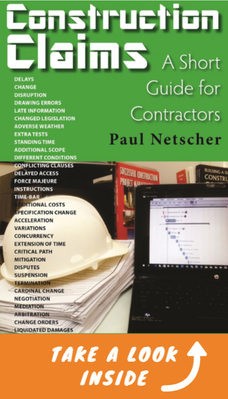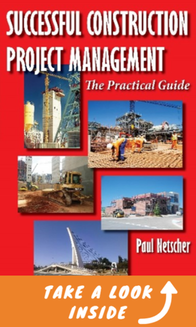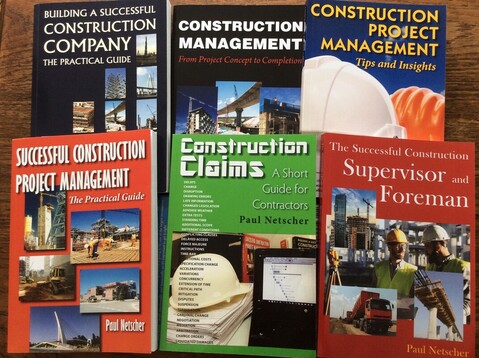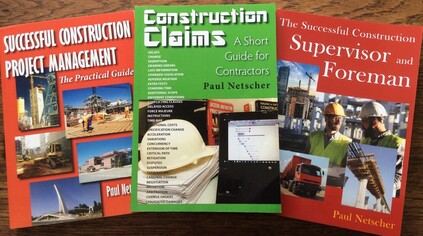|
Covid-19 has disrupted construction project around the World. The go to for many contractors is to lodge a Force Majeure claim for the delays they have suffered. This might not be the best clause to claim your delay under and you could consider the clause of changed legislation where the government or state has shut work sites down. This useful article from Batch Mewing Lawyers Force Majeure In Construction Contracts: Tips And Traps provides more information on Force Majeure and whether your project is entitled to claim for delays caused by Force Majeure. It's vital that you get your delay claim correct. Want to learn more about construction claims? "All 120 projects I’ve been involved with included Variation Claims – some for millions of dollars. Some projects doubled in value! Yet, 99% of claims were settled amicably and most of what we claimed was approved. More importantly we completed further projects with these clients.” Paul Netscher. Construction Claims: A Short Guide for Contractors, written by Paul Netscher is an easy to read simplified guide that gives an overview to construction claims. "An excellent, concise and very practical guide to successful claims process. This is a no nonsense approach that gets on with it. Packed full of valuable advice for both sides - contractor and employer. 'Short' in the title should not be mistaken for lack of valuable content - this is a cracking book. I also have the authors other books which are equally good. Highly recommended." (Reader Amazon UK) *****
1 Comment
Is there conflict on your construction project?Every construction project has a conflict. There’s conflict amongst workers within the teams, conflict between supervisors, conflict within the contractor’s management team, conflict with suppliers and subcontractors, conflict between subcontractors, and conflict between the client’s team and the contractor’s team. A construction project is a melting pot of egos, personalities, and cultures. It’s a stressed environment with everyone trying to do the best for themselves and their company, while getting the job completed as quickly as possible, often in difficult circumstances while working long hours. Why There is Conflict on Construction ProjectsSometimes you can’t avoid conflict on construction projects. You have to stand up to the client when they’re being unfair to your company and demanding things which aren’t in the contract document. You have to take a stand when people in your crew aren’t obeying company or project rules. You have to be tough on suppliers and subcontractors who aren’t delivering. But this must be done without yelling and swearing (regrettably I was often guilty of this). It’s important to explain why you’re unhappy and what’s unacceptable. Of course, there will always be some that make you angry. Some will be blocking access. Mistakes will be made. The wrong materials will be used, or materials you ordered for a task will go missing or have been wasted elsewhere on the project. Equipment will be damaged. Some will unfairly hog equipment, like cranes, so that your tasks are kept waiting. It’s good to be so passionate about the work that you care when others are impeding you. But, don’t fly into a rage. Understand that often others are also passionate about getting their work done. Others on the project are also stressed. Often, they aren’t even aware of the impact their actions are having on your work or the project. Explain logically what the problem is and more importantly how the problem should be resolved. Sure, you can show your displeasure and tell the person what impact their actions are having on your works so that the situation should be avoided in the future. But you also need to understand that completing the project is a team effort and the project isn’t complete until all sections of work are complete. Unquestionably, there will always be some incompetent managers and supervisors, there will be some idiots on the project, some managers and client’s representatives will be irritating with poor knowledge and little experience. Construction is like that. There are many who shouldn’t hold the position that they do, but you have to learn to work around them. If need help them. Tripping them up is seldom going to benefit you other than the short-term satisfaction it may provide. Obviously, never be so assured in your knowledge and self-esteem that you aren’t prepared to listen to the other person. None of us are so perfect that we can’t learn something new, or a new method of doing things. Sometimes even young and inexperienced managers may see things differently and come up with an innovative solution you hadn’t considered before, so first think before you raise an objection or flat-out no. Even idiots can sometimes surprise! Avoiding disputes on your construction projectThere will be times when others will be unhappy with you – rightly or wrongly. They may yell and swear at you. Of course, you won’t like that, but that’s no reason to yell and cuss back. Rather stay calm. If you did something wrong admit it and apologise – that will soon diffuse the situation and in most cases the other person will forget that anything happened and move on. Arguing something where you’re wrong will invariably escalate the situation making it worse. Certainly, if the other person is wrong then tell them why they’re wrong. Be prepared to argue your case in a clear logical manner without becoming emotional or personal about it – even if the other person is throwing personal insults. Sometimes arguments are over stupid small things. Consider if it’s really worth your time and effort to argue some silly point or misdemeanour. Some arguments are best walked away from. Sometimes though problems can’t be rationally resolved, the other person is never going to understand your point of view. In these cases, it may be necessary to involve a third party to settle the dispute. Conflicts within your construction crewOn occasion, there may be some in your crew fighting and arguing. This is disruptive and can jeopardise safety and productivity. It’s important to have a harmonious team and to step-in and quickly resolve the dispute. Listen to each person’s arguments and then logically explain who is right and who is wrong. Sometimes both might be wrong. Unfortunately, from time to time we get troublemakers in our team, or maybe just somebody that’s obnoxious and gets people’s backs up. If the person is unable to change their behaviour they may have to be moved elsewhere, possibly have their employment terminated. There will also sometimes be clashes of personality, someone does not see eye to eye with another. It’s important to understand why there’s a problem. If it’s because of racial, ethnic or any form of discrimination it’s important to stamp it out immediately, and the person being discriminatory should be warned to discontinue the behaviour or disciplinary action will be taken. If it’s simply a clash of personalities and neither party is prepared to back down then one of the workers may have to be transferred to another crew. But always try and talk through the problem with the two people. Talk to others in the crew to check that there isn’t another underlying cause that you’ve missed, a matter that could perhaps arise later in another form. Sure, sometimes it might seem like you’re a policeman, a psychologist, a judge, jury, and even sometimes like a parent, but unfortunately being a project manager, construction supervisor or foreman is all of these and more. ConclusionOf course, always make sure that you aren’t the cause of conflict on construction projects. Ensure that you aren’t taking your stress, frustration, and overwork out on others. Ensure that you aren’t hindering others from doing their job. Make sure that you aren’t being unduly difficult or unreasonable. It takes two people for there to be conflict. Is there conflict on your project? This article was first published on the ClockShark website. Please like, comment and share this post. Do you want to learn how to manage construction projects successfully?Paul Netscher has written several easy to read books for owners, contractors, construction managers, construction supervisors and foremen. They cover all aspects of construction management and are filled with tips and insights.
The books are available in paper and ebook from most online stores including Amazon. © 2019 This article is not to be reproduced for commercial purposes without written permission from the author. Do you know what to do if there’s a construction accident on your project? Does your crew know what to do if there’s an accident? It’s terrible when there’s an accident on a construction project, especially if someone is seriously injured. None of us really wants to think about an accident so often we and our crew are unprepared when an accident strikes. Yet being prepared for the worst, and having our crew prepared for an accident may just be the difference between life and death for someone. Construction is an inherently dangerous occupation and regrettably, accidents regularly occur on construction projects and they strike unexpectedly, even on safe and well-managed projects. Often time is of the essence when there’s an accident. Emergency services must be contacted and they must have directions to get to the scene of the accident as quickly as possible. What to do when a construction accident happens1. Contact emergency services Does everyone on your construction project know who to contact in the event of an accident? Some projects are spread over large distances – can crews contact emergency services in the case of a construction accident? Sometimes small crews are left after hours to finish off work – will they be able to call for assistance if there’s an accident? Work crews must have access to a working telephone or radio. Note that some projects in the country, particularly in hilly areas, may have parts of the project without mobile telephone reception so always ensure that workers can communicate in the event of an emergency. Providing every worker with a safety card of emergency numbers, including the contact details for company managers, which they keep in a wallet or pocket will mean that emergency numbers are always close at hand. Add the project address to the card so the person can immediately tell emergency services where they are. Even have new project workers input these numbers into their cell phone (mobile phone) during their inductions. 2. First-aid facilities Fully equipped first-aid kits must be available at key points on the project. These locations should be clearly signed so they can be found in an emergency. Unfortunately frequently items are removed from first-aid kits and they aren’t replenished, so the temptation is to lock the kits away. However, it’s vital that first-aid kits are easily accessible in an emergency, even after hours. It won’t help if the first-aid kit is in an office on the ground and the crew is working on the fifteenth floor of a high-rise building, or the kit is in a vehicle that has left the project on an errand. Of course, it would be terrible to open a first-aid kit in an emergency to find that it is incomplete and critical items you require aren’t there. It’s therefore important that first-aid kits have a list of their contents. The kit must be regularly checked and missing items replaced. Some products have expiry dates and these should be checked and expired products replaced. Preferably there should be a first-aid register to record treatments given and the products used. This register could be key to tracing treatments provided should the treated person’s condition deteriorate. It also serves as a way to track what products have been issued from the kit. There should be at least one trained first-aider on all projects and preferably only they should draw items from the first-aid kit. The work crew should never be allowed to take items from the first-aid kit unsupervised unless it’s an emergency. Anyway, all items removed should be recorded. Why don’t you attend a first-aid course? Your new knowledge could save a life – at work, even at home, or anywhere at any time. Don’t stand helplessly when there’s an accident – an understanding of first-aid could help you save a life. Serious construction accidentsAll workers on construction projects must attend a project induction. One of the topics discussed should be what to do in the event of an accident and who to call. In most areas, the hospital, doctor or ambulance crew will require details of the company’s health insurance, so it’s vital to have the necessary documentation handy so that the injured person can speedily receive the best treatment. In the event of a serious accident the injured person should be removed from immediate danger. Emergency services should be contacted. Someone should be sent to meet the emergency services, possibly to the project entrance or nearest road intersection, so they can direct the ambulance or fire tender to the scene. Emergency first-aid should be applied. Shut down operations in the area. Ensure the area is safe. This could include shutting down power and gas supplies. If the accident is on a road set up warning signs and barricades to stop or divert the traffic. Before the ambulance leaves find out where they’ll be taking the patient. Secure the injured person’s personal effects so that nothing goes missing. Management should be notified. The client should be notified. Always take photographs of the accident scene as soon as the situation is under control. Note the names of witnesses. For serious accidents and incidents cordon the accident area off. When there are serious injuries and death the authorities will have to be notified, which could include the police and the department of health and safety. Where the injured person is a union member their union will have to be notified. Insurers should be notified where there’s damage to a building, equipment, or someone that doesn’t work for your company is injured. The next of kin of the injured should be notified of the accident and which hospital the person has been taken to. After the accidentThe status of the people involved should be checked, and management and the client updated on their health and recovery. If it’s somebody in your crew visit them in hospital and ensure that they are being looked after. All serious incidents and accidents should be properly investigated. Only a designated company spokesperson should talk to the media so that there’s one version of the events. Your crew should not talk to the media. Conclusion good treatment is essential and time is of the essence....Continue Reading.... This article was first published on the ClockShark website. To visit this website and continue reading the article click on the link above. Please like, comment and share this post. Do you want to learn how to manage construction projects successfully?Paul Netscher has written several easy to read books for owners, contractors, construction managers, construction supervisors and foremen. They cover all aspects of construction management and are filled with tips and insights.
The books are available in paper and ebook from most online stores including Amazon. © 2019 This article is not to be reproduced for commercial purposes without written permission from the author. Last week we discussed preparing for your meeting: Construction Project Meetings - Part 1 Be prepared. So now hopefully you are ready for your meeting with the client. Make sure you arrive on time. It's rude to keep people waiting, it wastes everyone's time and it creates a bad impression. You can be sure that if you arrive late you have irritated the client and they be less sympathetic to what you have to say in the meeting. It goes without saying that you should arrive at the meeting with the minutes of the last meeting in your hand, as well as the documentation and answers that you required for the meeting. Have something to take notes. Try and cleanup before the meeting. It doesn't mean putting on a tie or jacket, but at least look respectable and professional. Believe it or not our work and competence is often judged on whether we look professional. Construction project meetingsIt's polite to turnoff the sound of your phone so an incoming call doesn't interrupt the meeting. Refrain from frequently looking at your phone and reading messages and emails. As I said in the article last week, project meetings are often a good time to discuss concerns and issues with the client's project team. At the start of the meeting raise any corrections to the previous meeting minutes. As mentioned it's not necessary to be pedantic and raise issue with spellings and grammar, but do correct the spelling of names if necessary. It is important that the facts as discussed at the last meeting have been fairly recorded and that there aren't additions in the minutes which weren't discussed. During the meeting make your own notes of important discussion points and answers. Not only is this a record so that you can check the meeting minutes when they are issued, but they remind you of stuff that you need to action when you get back to the project. Ensure you provide the correct information and answers at the meeting. Remember the meeting minutes are a record which could be later used to prove or refute a variation claim. Don't guess answers. If you're not sure of something then rather say so and commit to providing the answer after the meeting. If you have questions or things to discuss then ensure you raise them under the relevant agenda items. Don't make promises at the meeting, or commit to dates, without giving proper consideration to what you are committing to and whether you can deliver on the promise. Don't be pressured into committing to something you're not sure is doable. Rather ask for time to check and get back with a commitment. This doesn't mean that you are obviously obstructive or evasive. Just be sure of your answers. You may even choose to provide a qualified answer that you will probably achieve the date, but you must first check when you get back to your office and confer with others before providing a definitive answer. Avoid getting into petty arguments. If you are wrong, then admit it and move on. I've had construction managers working for me who have argued points when they were wrong. Even dragging them over to several following meetings, so the embarrassing item appeared in several meeting minutes. Learn to move on. Of course when you are right and the item is contractually significant then make sure you provide clear and correct answers and that your point of view is recorded in the minutes even if the client does not agree. The meeting should never be a shouting match, even if others are disrespectful at the meeting. Always stay calm and have your say. If your say is not accurately recorded in the meeting minutes then put the points in a letter afterwards. Don't talk over others and listen to what others are saying After project meetingsAfter the meeting go through your notes and action the things that need to be actioned. Convey information to your team that arose from the meeting. If there were decisions made at the meeting which have time or cost implications then ensure these are recorded. Get official client instructions where required, or lodge variations as necessary. Get back to the client's team with any answers or information you promised to provide at the meeting. Provide the missing information as soon as possible so you don't forget. Anyway efficient response provides the team reassurance that you reliably provide information when you don't have the exact answers at the meeting. Conclusion - construction project meetings are importantConstruction project meetings can provide a useful interaction with the client's team and they can be a pathway to resolve issues on the project. Regrettably the client's team is often responsible for managing the meeting and recording the minutes. They may steer the discussion away from sensitive or embarrassing subjects, or write the minutes in a one sided manner. It is therefore important to be prepared for the meeting, to check the previous meeting minutes carefully and report corrections and see that these are recorded, then to act professionally at the meeting, with calm and dignity. Remember the meeting minutes are often read by higher authorities, both from the client and even your managers. Try and ensure that your actions do not reflect poorly on your company. Project meeting minutes are a valuable record and they must be correct. Please like, share and comment. Do you want to learn how to manage construction projects successfully?Paul Netscher has written several easy to read books for owners, contractors, construction managers, construction supervisors and foremen. They cover all aspects of construction management and are filled with tips and insights.
The books are available in paper and ebook from most online stores including Amazon. © 2020 This article is not to be reproduced for commercial purposes without written permission from the author. Most projects have weekly or biweekly meetings with the client or their representatives. If the client has not scheduled meetings, it’s good practice to request them. Minutes of meetings should be circulated to all attendees Client meetings are often run to an agenda prepared by the client. The contractor should be free to add agenda items which they believe are relevant to managing the project successfully. Preparation for construction project meetingsProject Managers often go into meetings ill prepared and without information previously requested, resulting in items remaining on the minutes week-after-week. This reflects poorly on the contractor, and the Project Manager, because these minutes are usually circulated within the client and managing contractor’s organisations and are often read by senior people within these organisations. Items which aren’t closed out tend to irritate the client and managing contractor, giving the appearance that the contractor is ignoring them, and administrating the contract unprofessionally. The day before the meeting:
o client delays o correspondence not replied to o overdue payments o any new or potential problems  Site meetings are often ideal places to resolve issues or bring them to a head. Please like, share and comment. This article is an extract from the author's book 'Successful Construction Project Management: The Practical Guide' which is packed with construction project management tips and advice. Do you want to learn how to manage construction projects successfully?Paul Netscher has written several easy to read books for owners, contractors, construction managers, construction supervisors and foremen. They cover all aspects of construction management and are filled with tips and insights.
The books are available in paper and ebook from most online stores including Amazon. © 2020 This article is not to be reproduced for commercial purposes without written permission from the author. |
Archives
June 2024
Note: We welcome genuine comments, especially comments that add additional information to the subject matter in the article. We however reserve the right to remove inappropriate comments, which includes comments that have nothing to do with the subject, comments that include inappropriate language, and comments that are an advertisement for a product or company, or which include an advertising link. Comments must be in English. We will not enter into discussion on why a particular comment was removed.
CategoriesCopyright 2016 - The attached articles cannot be reproduced for commercial purposes without the consent of the author.
The opinions expressed in the attached articles are those of the writer. It should be noted that projects are varied and different laws and restrictions apply which depend on the location of the contractor and the project. It's important that the reader uses the supplied information taking cognisance of their particular circumstances. The writer assumes no responsibility or liability for any loss of any kind arising from the reader using the information or advice contained herein. "I have what I consider some of the best books on construction management."
Books are available from: Amazon.com Amazon.co.uk takealot.com kalahari.com Amazon.in Amazon.de Amazon.fr Amazon.it Amazon.com.au Powell's Fishpond uread bokus Amazon.ca Amazon.es Other retail stores Available in paperback or on Kindle "28 YEARS OF CONSTRUCTION PROJECT MANAGEMENT EXPERIENCE, DEVELOPING SUCCESSFUL CONSTRUCTION PROJECT MANAGERS AND BUILDING SUCCESSFUL CONSTRUCTION COMPANIES"
|











 RSS Feed
RSS Feed




